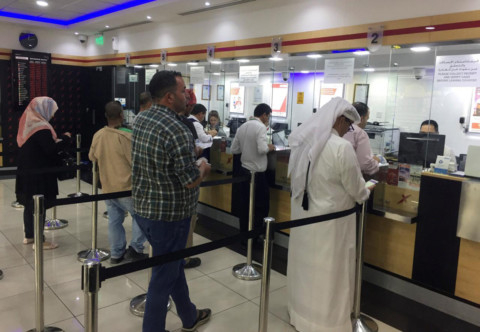
Dubai: The non-availability of US dollars in Qatar, which has been suffering due to sanctions imposed by Saudi Arabia and the UAE and others, are forcing banks and exchange houses to charge 8 per cent more even as they source the greenback from offshore, sources told Gulf News on Tuesday.
The Qatari Central Bank has imposed a daily limit on transactions that can happen through banks or exchange houses, sources said. The banks and exchange houses are quoting Qatari riyal below the peg, charging 3.94 Qatari riyals to give a dollar as against 3.6416 earlier, which has been in place in 2001, making the transaction expensive by more than 8 per cent.
“This shows there is a severe shortage of dollars, unless the Qataris get the dollars from somewhere else. It’s an indirect way of depreciating the currency. If this trend continues for long, we may see an eventual official depreciation of the currency,” said a currency strategist in Dubai.
Huge hit
“People are trying to get dollars from offshore, but it’s a huge hit for the clients,” said a senior official who works at an exchange house in the UAE, requesting anonymity, adding “they don’t want to give USD because of current political issue with the neighbours. If they use their US dollars from the forex reserve, it may pressure the peg of the currency.”
The Qatar Central Bank (QCB) had denied earlier that reports about trading in exchange rate are baseless and the Qatari riyal is “absolutely stable against the US dollar.”
“The QCB will guarantee all exchange transactions for customers inside and outside Qatar without delay, noting that all banks and local exchange companies are committed to exchanging it as usual,” it said in a statement in July.
The reserves and liquidity, a measure of the central bank’s ability to support the riyal currency, fell to $35.6 billion in September, their lowest level since at least 2012, from $39.0 billion in August.
Arbitrary pricing
This has resulted in arbitrary pricing for importers, exporters and expat population in the country. “Customers may not get a good deal because arbitrary pricing by the banks and exchange houses,” a second source said, adding “this has impacted the money movement through formal channels, and activated the informal channels.”
In June, Saudi Arabia and other Arab states cut diplomatic and transport ties with Doha on June 5, accusing it of backing terrorism. As a result, banks in Saudi Arabia, and the UAE and others have suspended transactions with Qatari banks.











